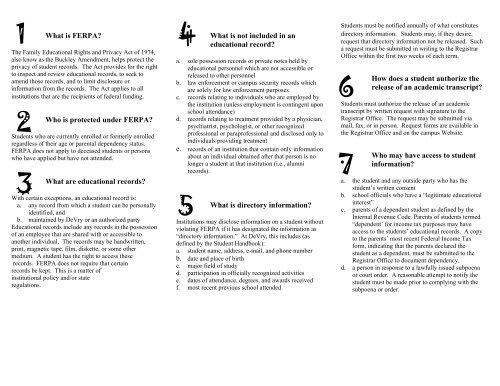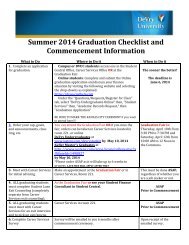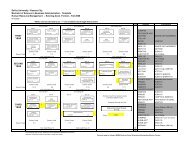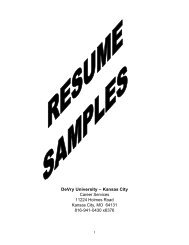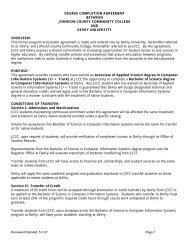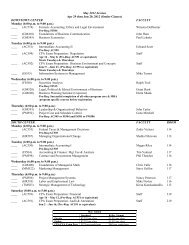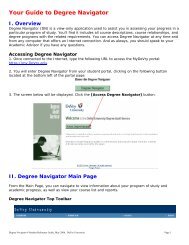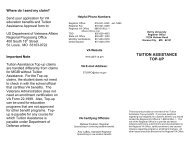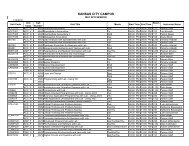FERPA Brochure (PDF)
FERPA Brochure (PDF)
FERPA Brochure (PDF)
Create successful ePaper yourself
Turn your PDF publications into a flip-book with our unique Google optimized e-Paper software.
1<br />
What is <strong>FERPA</strong><br />
The Family Educational Rights and Privacy Act of 1974,<br />
also know as the Buckley Amendment, helps protect the<br />
privacy of student records. The Act provides for the right<br />
to inspect and review educational records, to seek to<br />
amend those records, and to limit disclosure or<br />
information from the records. The Act applies to all<br />
institutions that are the recipients of federal funding.<br />
2<br />
Who is protected under <strong>FERPA</strong><br />
Students who are currently enrolled or formerly enrolled<br />
regardless of their age or parental dependency status.<br />
<strong>FERPA</strong> does not apply to deceased students or persons<br />
who have applied but have not attended.<br />
3<br />
What are educational records<br />
With certain exceptions, an educational record is:<br />
a. any record from which a student can be personally<br />
identified, and<br />
b. maintained by DeVry or an authorized party<br />
Educational records include any records in the possession<br />
of an employee that are shared with or accessible to<br />
another individual. The records may be handwritten,<br />
print, magnetic tape, film, diskette, or some other<br />
medium. A student has the right to access these<br />
records. <strong>FERPA</strong> does not require that certain<br />
records be kept. This is a matter of<br />
institutional policy and/or state<br />
regulations.<br />
4<br />
What is not included in an<br />
educational record<br />
a. sole possession records or private notes held by<br />
educational personnel which are not accessible or<br />
released to other personnel<br />
b. law enforcement or campus security records which<br />
are solely for law enforcement purposes<br />
c. records relating to individuals who are employed by<br />
the institution (unless employment is contingent upon<br />
school attendance)<br />
d. records relating to treatment provided by a physician,<br />
psychiatrist, psychologist, or other recognized<br />
professional or paraprofessional and disclosed only to<br />
individuals providing treatment<br />
e. records of an institution that contain only information<br />
about an individual obtained after that person is no<br />
longer a student at that institution (i.e., alumni<br />
records).<br />
5<br />
What is directory information<br />
Institutions may disclose information on a student without<br />
violating <strong>FERPA</strong> if it has designated the information as<br />
“directory information.” At DeVry, this includes (as<br />
defined by the Student Handbook):<br />
a. student name, address, e-mail, and phone number<br />
b. date and place of birth<br />
c. major field of study<br />
d. participation in officially recognized activities<br />
e. dates of attendance, degrees, and awards received<br />
f. most recent previous school attended<br />
Students must be notified annually of what constitutes<br />
directory information. Students may, if they desire,<br />
request that directory information not be released. Such<br />
a request must be submitted in writing to the Registrar<br />
Office within the first two weeks of each term.<br />
6<br />
How does a student authorize the<br />
release of an academic transcript<br />
Students must authorize the release of an academic<br />
transcript by written request with signature to the<br />
Registrar Office. The request may be submitted via<br />
mail, fax, or in person. Request forms are available in<br />
the Registrar Office and on the campus Website.<br />
7<br />
Who may have access to student<br />
information<br />
a. the student and any outside party who has the<br />
student’s written consent<br />
b. school officials who have a “legitimate educational<br />
interest”<br />
c. parents of a dependent student as defined by the<br />
Internal Revenue Code. Parents of students termed<br />
“dependent’ for income tax purposes may have<br />
access to the students’ educational records. A copy<br />
to the parents’ most recent Federal Income Tax<br />
form, indicating that the parents declared the<br />
student as a dependent, must be submitted to the<br />
Registrar Office to document dependency.<br />
d. a person in response to a lawfully issued subpoena<br />
or court order. A reasonable attempt to notify the<br />
student must be made prior to complying with the<br />
subpoena or order.
8<br />
What is a school official (as defined<br />
by the Student Handbook)<br />
a. a person employed by DeVry in an<br />
administrative, supervisory, academic,<br />
research, or support staff position<br />
b. a person elected to the Board of Directors<br />
c. a person employed by or under contract to<br />
DeVry to perform a special task, such as an<br />
attorney or auditor<br />
9<br />
g.<br />
What is “legitimate educational<br />
interest (as defined by the Student<br />
Handbook)”<br />
A school official has a legitimate educational<br />
interest if the official is:<br />
a. performing a task that is specified in his or<br />
her position description or by a contract<br />
agreement<br />
b. performing a task related to a student’s<br />
education<br />
c. performing a task related to the discipline of<br />
a student<br />
d. providing a service or benefit relating to the<br />
student or student’s family, such as<br />
advising, job placement, financial aid, or<br />
housing assistance<br />
10<br />
The exceptions:<br />
When is the student’s consent not<br />
required to disclose information<br />
a. to school officials with a legitimate educational<br />
interest<br />
b. to officials of another school in which the student<br />
seeks to enroll<br />
c. to certain federal, state, and local authorities in<br />
connection with an audit or evaluation of state or<br />
federally supported educational programs<br />
d. to anyone providing financial aid to the student<br />
e. to agents acting on behalf of DeVry (clearinghouses,<br />
degree/enrollment verifiers)<br />
f. to organizations conducting studies on behalf of<br />
DeVry<br />
to accrediting organizations<br />
h. to parents of a dependent<br />
i. to parents/legal guardians when their children under<br />
age 21 have violated the alcohol or drug policies of<br />
DeVry<br />
j. to comply with a judicial order or subpoena<br />
k. to appropriate parties in a health or safety emergency<br />
l. to the student<br />
m. results of disciplinary hearings to an alleged victim<br />
of a crime of violence or non-forcible sex offense<br />
n. to the Immigration and Naturalization Service for<br />
purposes of the Student Exchange Visitor<br />
Information System<br />
o. to military recruiters who request “Student<br />
Recruiting Information.” Student recruiting<br />
information is defined as name, address, telephone<br />
listing, age, level of education, and major.<br />
p. to the Internal Revenue Service in compliance with<br />
the Taxpayer Relief Act<br />
q. to the Department of Veterans Affairs<br />
Family Educational<br />
Rights and Privacy Act<br />
(<strong>FERPA</strong>)<br />
Guidelines for<br />
Rev. September 2004


